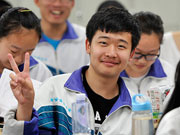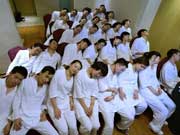Scholars and representative from China and Iran discussed the construction of the new Silk Road, the Silk Road economic belt, and the promotion of cultural exchanges at a seminar in Beijing on Tuesday.
The "21st century China-Iran Silk Road Seminar", jointly held by Cultural Counsellorship of Embassy of Islamic Republic of Iran, Donggan (Hui ethnic group in Central Asia) Research Institute at Minzu University of China, Beijing Ethnic Education Association, and Beijing Huimin School, brought together nearly 50 experts, scholars, and representatives from China and Iran.
Chinese President Xi Jinping put forward an initiative to build a Silk Road economic belt during the visit to Kazakhstan last September, which has received positive responses from Asian and European countries. During the 4th CICA Summit in Shanghai last month, Xi had a meeting with Iranian President Hassan Rouhani. The two leaders reached broad consensus on issues including building a Silk Road economic belt and a 21st century Maritime Silk Road.
Cultural Counselor of the Embassy of Iran in China Hossein Jalivand said that both Iran and China are ancient civilizations along the Silk Road, and the initiative to build a Silk Road economic belt is a rare opportunity for countries along the Silk Road to deepen exchanges and cooperation.
Commercial Counselor of the Embassy of Iran in China Hussein Huslav, on behalf of the Iranian Ambassador to China Mahdi Safari, delivered an opening speech. "The proposal initiated by Chinese President can be a framework to strengthen the economic cooperation between the two countries," he said.
Liu Zhentang, former Chinese Ambassador to Iran, stressed the unique status of Iran along the Silk Road. He pointed out that although China and Iran have different system and beliefs, the two countries share common values: mutual respect, fairness and equality, independence, mutual benefit and win-win, and they are opposed to any form of power politics and hegemony.
When putting forward the initiative of building the "Silk Road economic belt", President Xi stressed that it is open to regions and countries beyond those along the traditional Silk Road, and the cooperation will focus on five areas, namely, policy communication, road connectivity, unimpeded trade, monetary circulation and understanding between the people.
Hu Zhenhua, a professor with Minzu University of China, also highlighted the importance of the five areas during the seminar. He talked about the formation and development of China's Hui ethic group, and pointed out the significance of multi-ethnic cultural exchanges and integration in the Silk Road development. "There will be no Hui ethnic group in today's China if there was no the Silk Road," he remarked. Hu also suggested China and Iran to promote the new Silk Road and the "Silk Road economic belt" through seminars, lectures, exhibitions, publications, and language learning.
Massoud Shamaeizadeh, an Iranian entrepreneur in China, stressed the importance of strengthening cultural exchanges between the two countries. He said that when mentioning Iran, the first thing came into Chinese people's mind would be war, mystery, oil, and dessert. He called for more cultural exchanges to let more Chinese people experience Iran culture and thus change their impressions about Iran.
 |

 9.4 million high-school students enrolled in national college entrance examination
9.4 million high-school students enrolled in national college entrance examination Top 20 hottest women in the world in 2014
Top 20 hottest women in the world in 2014  World's largest solar-powered plane makes maiden fly
World's largest solar-powered plane makes maiden fly Royal Danish Embassy holds Open Denmark Day 2014
Royal Danish Embassy holds Open Denmark Day 2014 Traditional Dragon Boat Festival celebrated across China
Traditional Dragon Boat Festival celebrated across China Who is China's campus beauty queen?
Who is China's campus beauty queen? White collars learn how to sleep
White collars learn how to sleep Silent world of EOD personnel
Silent world of EOD personnel Subway passengers in Beijing face strict security checks
Subway passengers in Beijing face strict security checks 16 Chinese films with a Cannes Award
16 Chinese films with a Cannes Award
Day|Week|Month